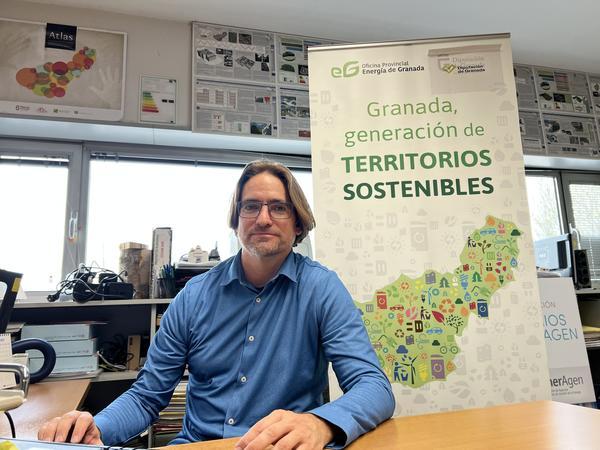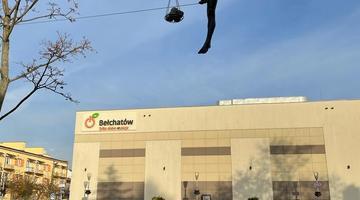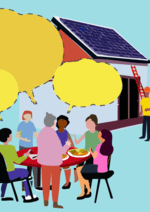Lessons from Granada: finding the rhythm of citizen-led energy

It’s easy to imagine the perfect ensemble: Let's bring together citizens, businesses and social groups from the same municipality and manage energy production and consumption together. With the support and funding of public administrations, nothing should stand in the way of local energy communities providing tangible local benefits and supporting the energy transition.
However, when Gonzalo Esteban, a promoter of energy communities from Granada’s Office of Community Transformation, prepares to meet with a new municipality interested in setting one up, he knows all too well that many obstacles remain. For several years, working within the Energy Office of the Provincial Council of Granada, he has been promoting and advising initiatives built around this idea. But at times, he felt the message still wasn’t being heard.
On several occasions, the call to create an energy community in a town has only attracted half a dozen residents. On those occasions, when he finds himself in a half-empty room, accompanied by so few people interested in sharing the production and consumption of energy from their own municipality, the music seems to play very softly.
Seeking to change the melody, Gonzalo applied – and won – support from SHARED GREEN DEAL in 2023. His satisfaction was not so much about the funding (some 20.000 EUR to help organise events) but about the signal: there is nothing better than a strong backing band to continue working towards the energy transition.
“As a European project manager and having participated in several similar projects to SHARED GREEN DEAL, I am increasingly convinced that to work in the field, it is essential to talk to local stakeholders. Citizen participation is vital for the energy transition. Offers such as SHARED are very timely because they provide the flexibility needed to work with the community,” says Gonzalo Esteban.
He gives an example: “sometimes, we have had to organise a more social event in the municipality to attract more people in a more relaxed way. And taking advantage of that event, we have explained the benefits of creating an energy community. Other times, we have seen that one of the best ways to reach residents is through the priest or the municipality's social services because they have broad citizen support. Getting the message to spread through the right channels is incredibly important.”
Based on these experiences, Gonzalo Esteban believes that European projects should not focus so much on being implemented in a minimum amount of time, but rather on dedicating sufficient time to ensuring that the implementation of the project is aligned with the people and institutions that are the beneficiaries of that project and those affected by it.
There is no point in building good infrastructure from a technical point of view if it is going to generate opposition in the area and not be sufficiently accepted for its use and maintenance. Such attitudes can generate a lot of mistrust.
- Gonzalo Esteban, Technical Manager, ECO GRANADA
Local activities driving regional change
With the renewed support, the music started playing again. Between September 2023 and February 2024, the Provincial Council of Granada — as a SHARED GREEN DEAL Local Partner — organised 13 events in 11 towns, aimed at politicians, businesses and citizens. Follow-up interviews were conducted in April and May 2024, and the pilot wrapped up in July.
“We work well with all groups, although each one has a different vision. The mayor of Salar (a small municipality with just over 2,000 inhabitants), for example, has been key in promoting the local energy community and is absolutely convinced of the need to involve citizens more in this initiative,” Gonzalo Esteban says and continues:
“In general, politicians consider everything related to promoting public action to combat climate change to be necessary, although they often do not know what specific actions to take or how to implement them. In this sense, energy communities emerge as a viable option. However, they have many doubts: what legal structure to use, how to carry out the procedures, why to raise funding to collaborate only with citizens who participate in the energy community, etc.”
Many of these doubts — legal, technical, financial — were exactly what Gonzalo set out to address through the events. By bringing together municipalities, citizens, and companies, he created space to ask questions and lower the barriers to engagement. Reactions varied: some small energy-sector businesses viewed energy communities as competition, while others saw potential partnerships. Most, however, shared a common uncertainty — about procedures, collaboration with public authorities, and customer communication.
Citizens expressed different concerns. According to studies by the University of Granada, most of those involved in energy communities in the province have a university education. Without that background, residents often see energy communities as overly complex, or fear that the effort outweighs the benefits — unless clear incentives are in place.
“The general public, if they are not clear about the benefits it will bring them, are unlikely to get involved,” concludes Gonzalo Esteban.
From Dialogue to Delivery
Since the events were organised in 2024, five new energy communities have been established in Granada and the impact goes further. Many other initiatives have emerged and are now turning to the Energy Office for guidance:
“The support aspect is vital because these are complex projects,” Gonzalo explains, noting that support is a central part of their mission
Among the topics covered during the SHARED GREEN DEAL workshops, legal guidance proved especially valuable, he explains: “We learned a lot about the legal side and are transferring this to the different initiatives to transfer roofs, start the paperwork, justify the procedure, align ourselves with other initiatives etc.”
Gonzalo emphasises the need to build on this momentum by encouraging more social gatherings to boost participation, creating tools to simplify the process, and developing business models that ensure energy communities are viable in the long term.
His team has already taken the next step. Drawing on experience from SHARED GREEN DEAL, they launched a new Energy Community Advisory Office in 2024 — supported by a grant from Spain’s national energy agency (IDAE). The goal is to provide municipalities, companies and citizens across Granada with dedicated advice and ongoing support. Once again, seeking to connect experts, companies, citizens and politicians, supporting change.
The music is playing — but as Gonzalo Esteban notes, there is still work to be done at all levels. Work his office will continue to promote from the regional level:
“At the national level, I am moderately optimistic about the launch of energy communities. There is aid, but there is still no favourable legal framework for energy communities, as established by European directives. In addition to other tools already in place, such as the community offices themselves to promote energy communities, there should be further regulatory development to provide additional advantages and legal certainty for energy communities,’ he ends.
Written by Gustavo Gómez. CEO of Acento Comunicación.
Author: Acento Comunicación
Related Green Deal Priorities
Related localities
Related events
Related Resources


CONTACT
For further details please contact co-leads Professor Chris Foulds (chris.foulds@aru.ac.uk) and Professor Rosie Robison (rosie.robison@aru.ac.uk).

This project has received funding from the European Union’s Horizon 2020 research and innovation program under grant agreement No 101036640. The sole responsibility for the content of this website lies with the SHARED GREEN DEAL HAS project and does not necessarily reflect the opinion of the European Union.



